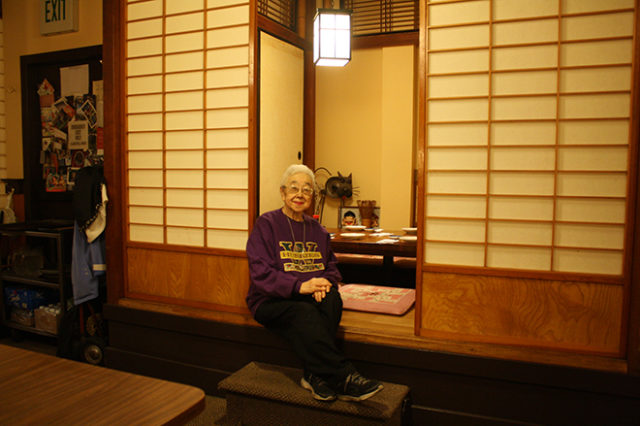Maneki celebrating its 115th anniversary in 2019
By Bruce Rutledge,
Fusae Yokoyama, a bartender and hostess at Maneki Restaurant for the last 56 years, still serves drinks at the front bar on Sundays and Tuesdays. She’s an 88-year-old ikijibiki, or “living dictionary,” of International District history, having grown up in the Togo Hotel (now a parking lot next to the Panama Hotel), which used to stand just a couple of blocks from the prewar Maneki. “The restaurant was a huge, beautiful castle back then,” she recalls. “I remember playing there. I used to do classical Japanese dancing and I danced there one time.”
Of course, the prewar version of Maneki ceased to exist when Japanese Americans were imprisoned in the Minidoka concentration camp during World War II. But Fu-chan, as her friends and fans call her, even remembers those days fondly – a testament to her mother and father’s ability to shield their children from the grim reality of that time. “To tell the truth, we all had fun,” she laughs. “My father and my grandfather – they’re the ones who lost their jobs and everything. We were little kids. We all ate together. We went to school and church. We had a great time. It sounds really bad, but I think we had a much, much better life than the people of Japan because they suffered. They didn’t have any food. We were fed three times a day. We had our 3 o’clock snack.”

found in the North American Times 1918 January 1st issue which is the oldest remaining copy of the North American Posts New Year issue
Yokoyama, a sansei, remembers the old Japantown, which extended down to the water, as a very safe place during her young adulthood. “We used to walk around at 1 or 2 o’clock in the morning, and we were never scared,” she says. “Nobody used to lock their car or their house. It was all Japanese stores and restaurants.”
At home, she spoke Japanese, she remembers. “My grandmother and grandfather made sure we knew how to speak Japanese. They taught us to speak casual Japanese at home and more or less formal Japanese outside.”
Yokoyama got married when she was 17 in 1948. “My husband used to do Kabuki. I think I fell in love with him when I was only 9 or 10 years old,” she recalls. They raised six boys, all of whom eventually worked at Maneki as busboys. Today, she has 17 grandchildren and 10 great grandchildren. “Three of my grandchildren worked as busboys at Maneki too,” she says. “They loved it. The girls (on the staff) babied them.”
When she started working at Maneki in the early 1960s, it was a lively spot. “We were the first to do karaoke. My husband started it. We used to have a live 3- or 4-piece orchestra,” she recalls. “When I was bartending, it would be full at 1:30 or 2, and I’d have to tell everyone to drink up and go home.”

In the late 1960s, Shiro Kashiba started serving nigiri sushi in the back bar, thus beginning a culinary revolution. Fuchan, as Chef Shiro affectionately calls her, is still close to the Kashiba family. She even carded Bill Gates when he dropped in for dinner. “I was supposed to card everyone,” she says with a grin, “so I said, ‘May I see your ID?’ And my boss said, ‘Mom, did you card him?!”
Japanese movie stars used to dine here. “The guy who eats weird things …” Yokoyama says, searching her memory? Anthony Bourdain? “That’s it. He came too.”
Yokoyama, whose family roots extend back to Hiroshima, greets guests with her cheery smile two nights a week when she isn’t bartending. She’s lived most of her life in Seattle’s Japantown and spent much of her adult life working in Maneki. So many of her memories are packed into a couple of blocks of the ID. “Both good and bad, but mostly good,” she says. “This is my life and I love it here, and I wouldn’t change a thing.”
Maneki Restaurant
304 6th Ave S, Seattle
(206) 622-2631 | manekirestaurant.com







